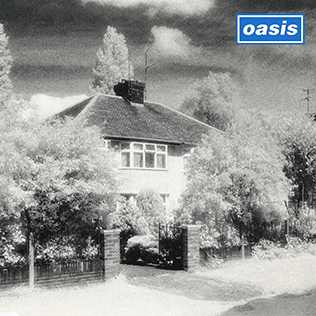
"Live Forever" is a song by the English rock band Oasis. Written by Noel Gallagher, the song was released as the third single from their debut album Definitely Maybe (1994) in August 1994, just prior to that album's release. Gallagher began writing the song in 1991, before he joined Oasis.
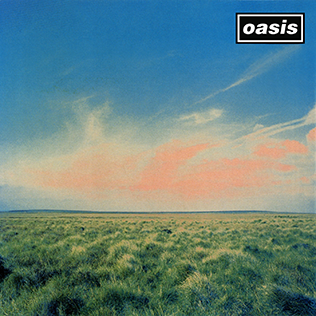
"Whatever" is a song by the English rock band Oasis. Written by the band's lead guitarist, Noel Gallagher, it was released on 18 December 1994 by Creation as the band's first non-album single. A subsequent lawsuit awarded a co-writing credit to Neil Innes.

"Cigarettes & Alcohol" is a song by the English rock band Oasis, written by Noel Gallagher. It was released on 10 October 1994 as the fourth and final single from their debut album Definitely Maybe (1994), and their second to enter the UK top ten in the United Kingdom, peaking at number 7, eventually spending 79 weeks on the charts. On 13 March 2020, nearly 26 years after its release, the song was certified Platinum, indicating 600,000 sales.

"Lyla" is a song by the English rock band Oasis. It was released in May 2005 as the first single from their sixth studio album, Don't Believe the Truth (2005). "Lyla" was the band's first single following the departure of their long-time drummer Alan White, and replaced by Ringo Starr's son and the Who drummer Zak Starkey as an additional drummer of the band.

"Supersonic" is a song by English rock band Oasis, released as their debut single on 11 April 1994, and later appeared on their debut studio album, Definitely Maybe (1994). It was produced by the band and Mark Coyle, their live sound engineer. The single was accompanied by two music videos, one directed by Mark Szaszy and the other by Nick Egan.

"Some Might Say" is a song by the English rock band Oasis. It was released as the first single on 24 April 1995 by Creation from their second studio album, (What's the Story) Morning Glory? (1995). The song was written by the band's lead guitarist Noel Gallagher. "Some Might Say" provided Oasis with their first number one on the UK Singles Chart and reached the top 10 in Finland, Iceland, Ireland and Sweden. The song is also the last to feature all five original members, as the drummer Tony McCarroll was fired shortly after the song's release.

"Roll with It" is a song by English rock band Oasis, written by lead guitarist Noel Gallagher. It was released on 14 August 1995 by Creation as the second single from their second studio album, (What's the Story) Morning Glory? (1995). In a highly publicised chart battle with Blur's single "Country House" dubbed "The Battle of Britpop," "Roll with It" reached number two on the UK singles chart.

"Songbird" is a song by English rock band Oasis from their fifth studio album, Heathen Chemistry (2002), and is the first single by Oasis written by vocalist Liam Gallagher. Released on 3 February 2003, the song reached number three on the UK Singles Chart, number two on the Canadian Singles Chart, and the top 10 in Ireland and Italy. During an interview with The Matt Morgan Podcast, Liam's brother and bandmate Noel Gallagher called the track a "perfect" song.

"D'You Know What I Mean?" is a song by English rock band Oasis. Written by Noel Gallagher, it was released on 7 July 1997 as the first single from their third album, Be Here Now (1997).
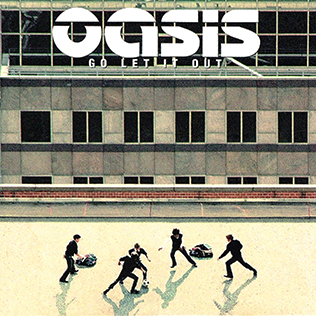
"Go Let It Out" is a song by English rock band Oasis, written by the band's lead guitarist, and chief songwriter, Noel Gallagher. It was released on 7 February 2000 as the first single from their fourth studio album, Standing on the Shoulder of Giants (2000), as well as their first following the departure of rhythm guitarist Bonehead and bassist Guigsy. The song peaked at number one on the UK Singles Chart and was later certified Gold for sales and streams exceeding 400,000. It also reached number one in Ireland, Italy, and Spain, as well as on the Canadian Singles Chart.

"Little by Little" is a song by English rock band Oasis, first released as the sixth track on their fifth studio album, Heathen Chemistry. In September 2002, it was released with "She Is Love" as the first double A-side single by the band, peaking at number two on the UK Singles Chart and number nine on the Irish Singles Chart. "Little by Little" by itself reached number two on the Canadian Singles Chart and number five in Italy. Noel Gallagher provides lead vocals on both tracks, which he also wrote.

"Stand by Me" is a song by the English rock band Oasis, written by lead guitarist, Noel Gallagher. It was released on 22 September 1997 as the second single from the band's third studio album, Be Here Now (1997).

"Who Feels Love?" is a song by English rock band Oasis, written by the band's lead guitarist Noel Gallagher. It became the second single to be released from the album Standing on the Shoulder of Giants, peaking at number four on the UK Singles Chart and entering the top 20 in Ireland, Italy, and Spain.
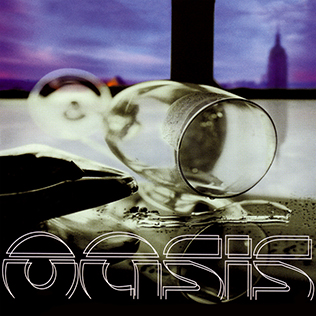
"Sunday Morning Call" is a song by the English rock band Oasis, released as the third and final single from their fourth studio album, Standing on the Shoulder of Giants. It reached number four on the UK Singles Chart, number five in Italy, and number 20 in Ireland.
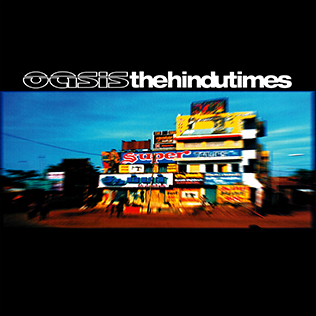
"The Hindu Times" is a song by English rock band Oasis. It was written by the band's lead guitarist Noel Gallagher, and was released as the lead single from their fifth studio album, Heathen Chemistry, on 15 April 2002. On the album, it segues directly into the next track, "Force of Nature."

"Let There Be Love" is a song by English rock band Oasis from their sixth studio album, Don't Believe the Truth (2005). Written by Noel Gallagher, it is the third and the last Oasis song to feature Liam and Noel on lead vocals, the first being "Acquiesce" and the second being "Put Yer Money Where Yer Mouth Is". It was released on 28 November 2005 as the third and final single from the album in the United Kingdom and as the second single in the United States.

"The Importance of Being Idle" is a song by English rock band Oasis. It was released on 22 August 2005 in the UK as the second single from their sixth studio album, Don't Believe the Truth (2005), written, produced, and sung by lead guitarist Noel Gallagher. The song was written by Gallagher in the mid-2004, before the band made their final attempt at recording what would become Don't Believe the Truth.

"Morning Glory" is a song by the English rock band Oasis, written by Noel Gallagher and released on the band's second album (What's the Story) Morning Glory? in September 1995. It was given a commercial single release only in Australia, New Zealand, and Japan, and it was also a radio single in the United States and Canada. In North America, it was the first song of the album to receive significant airplay, although primarily at alternative rock radio stations, as "Some Might Say" and "Roll with It" had not achieved as such.

The English rock band Oasis have released seven studio albums, two live albums, five compilation albums, six video albums, one extended play, twenty seven singles which includes one double single, nineteen promotional singles and thirty-six music videos. As of 2024, the band have sold 75 million records worldwide, making them one of the best-selling music artists of all time and been named by Guinness World Records as the most successful act in the United Kingdom between the years 1995 and 2005. Oasis had 22 consecutive UK top 10 hits between 1994 and 2008. Oasis was formed in 1991 by vocalist Liam Gallagher, guitarist Paul "Bonehead" Arthurs, bassist Paul "Guigsy" McGuigan and drummer Tony McCarroll – they were later joined by guitarist and songwriter Noel Gallagher. The band signed to Creation Records in May 1993 and released their debut single "Supersonic" the following year; it peaked at number 31 in the United Kingdom. Follow-up singles "Shakermaker" and "Live Forever" became UK top 15 hits, with the latter also attaining success in the United States. Definitely Maybe, the band's debut studio album, topped the UK Albums Chart and went on to be certified eight times platinum by the British Phonographic Industry (BPI).

"Don't Look Back in Anger" is a song by English rock band Oasis. It was written by the band's lead guitarist and chief songwriter Noel Gallagher, and produced by Gallagher and Owen Morris. Released on 19 February 1996 by Creation Records as the fifth single from their second studio album, (What's the Story) Morning Glory? (1995), it became Oasis's second single to reach number one on the UK Singles Chart, earning a quintuple-platinum sales certification in the UK. It was the first Oasis single with lead vocals by Noel, who had previously only sung lead on B-sides, instead of his brother Liam. Noel would later sing lead vocals on six other singles. The music video was directed by Nigel Dick, featuring the band performing at a mansion where a large group of women appears.




















